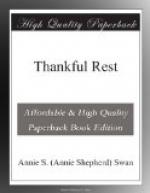You would have laughed had you seen the varying expressions on Tom’s face as he read Aunt Hepsy’s epistle;—concern at first to hear Lucy was ill; relief to find her recovering; and, last of all, mute, dumfoundered amazement at Aunt Hepsy.
Mr. Keane opened his studio by-and-by and looked out.
“Well, Tom, news from Lucy at last, my boy?” he asked.
“No, sir,” said Tom soberly, yet with an odd twinkle in his eye; and then he held out the open letter, saying simply, “Read that, Mr. Keane.”
Mr. Keane smiled too as he read. “Lucy has conquered, as I thought she would,” he said. “See, Tom, what an influence a meek, gentle, loving spirit like Lucy’s has in the world. You and I with our fiery tempers sink into nothingness beside her.”
“You, Mr. Keane!” echoed Tom in amazement. “I don’t think you have a temper at all.”
“Haven’t I?” The artist’s smile grew sad. “There was a boy once who was expelled from three schools for impertinence and insubordination, and put his parents to the expense of keeping a tutor for him at home. That tutor, Tom, was a man of splendid talents, which his delicate health forbade him to exercise as he desired. His pupil killed him, Tom; the worry and anxiety lest he should not come up to the parents’ expectation, combined with what he had to bear from the boy himself, broke his health down, and he died. That boy was me.”
Tom sat wondering, while Mr. Keane, walking to and fro, continued slowly—“I went to see him when he was dying, in his poor lodging: he was very poor, you must understand, but nobody durst offer him anything, lest he should feel hurt or insulted. As long as I live, Tom, I shall never forget that night. I saw then clearly how wicked I had been, and how what I thought manly independence befitting my station was only the cowardice of a spirit as far beneath his as earth is beneath heaven. That was a lesson I never forgot; and since that night I have tried, with God’s help, to use the legacy he left me.”
“What was it?” asked Tom breathlessly.
Mr. Keane lifted Lucy’s Bible from the side-table, and turning over the pages held it out to Tom, his finger pointing to the place.
“Blessed are the meek: for they shall inherit the earth.”
“Tom,” said Mr. Keane one morning a few days later, “I believe you are going to Pendlepoint tomorrow?”
“What?” Tom nearly bounded off his chair. The longing to go home to Lucy for a day or two had well-nigh overcome him since Aunt Hepsy’s letter came; but he had tried to stifle it, and had applied himself with double energy to his studies.
“If you don’t wish to go, of course I have no more to say,” began Mr. Keane; but Tom interrupted him—
“O sir, you don’t mean me to go home for good and all, I hope; have I disappointed you? I have tried so hard, sir.”
“Stop, stop!” cried Mr. Keane. “Wait till I hint at such a thing. You have surpassed my expectations, my boy. I thought you would like to see your sister, but if I am mistaken—”




